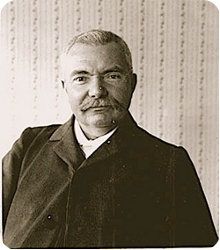A Quote by James Madison
In framing a system, which we wish to last for ages, we should not lose sight of the changes which ages will produce.
Related Quotes
What matters at this stage is the construction of local forms of community within which civility and the intellectual and moral life can be sustained through the new dark ages which are already upon us. And if the tradition of the virtues was able to survive the horrors of the last dark ages, we are not entirely without ground for hope. This time however the barbarians are not waiting beyond the frontiers; they have already been governing us for quite some time.
We are heirs of the ages because throughout the ages mankind has devised and fashioned new things, and step by step added new conquests to our domain in that incessant contest with nature which means life. But we are decadent heirs if we cannot use the instruments that the ages have put into our hands. The acquisition of these, in the largest scope, is education.
Mountains have been formed by one [or other] of the causes of the formation of stone, most probably from agglutinative clay which slowly dried and petrified during ages of which we have no record. It seems likely that this habitable world was in former days uninhabitable and, indeed, submerged beneath the ocean. Then, becoming exposed little by little, it petrified in the course of ages.
In western civilization, the period ruled by mysticism is known as the 'Dark Ages' and the 'Middle Ages'. I will assume that you know the nature of that period and the state of human existence in those ages. The Renaissance broke the rules of the mystics. "Renaissance" means the "rebirth". Few people today will care to remind you that it was a rebirth of reason - of man's mind.
... ages in which the dominant weapon is expensive or difficult to make will tend to be ages of despotism, whereas when the dominant weapon is cheap and simple, the common people have a chance... A complex weapon makes the strong stronger, while a simple weapon -- so long as there is no answer to it -- gives claws to the weak.
Man passes; he knows that he is dust; nothing is more evident than his frailty. If he should for a single moment forget it, what a chorus of voices would recall it to him! And yet, in the drop of existence which he absorbs, he takes in ages through memory and ages through presentiment. In the moments as they pass, he dimly sees eternity, and more than this, he possesses it by anticipation.
The dark ages still reign over all humanity, and the depth and persistence of this domination are only now becoming clear. This Dark Ages prison has no steel bars, chains, or locks. Instead, it is locked by misorientation and built of misinformation. Caught up in a plethora of conditioned reflexes and driven by the human ego, both warden and prisoner attempt meagerly to compete with God. All are intractably skeptical of what they do not understand. We are powerfully imprisoned in these Dark Ages simply by the terms in which we have been conditioned to think.
I foresee the time when industry shall no longer denude the forests which require generations to mature, nor use up the mines which were ages in making, but shall draw its raw material largely from the annual produce of the fields. I am convinced that we shall be able to get out of yearly crops most of the basic materials which we now get from forest and mine.


































